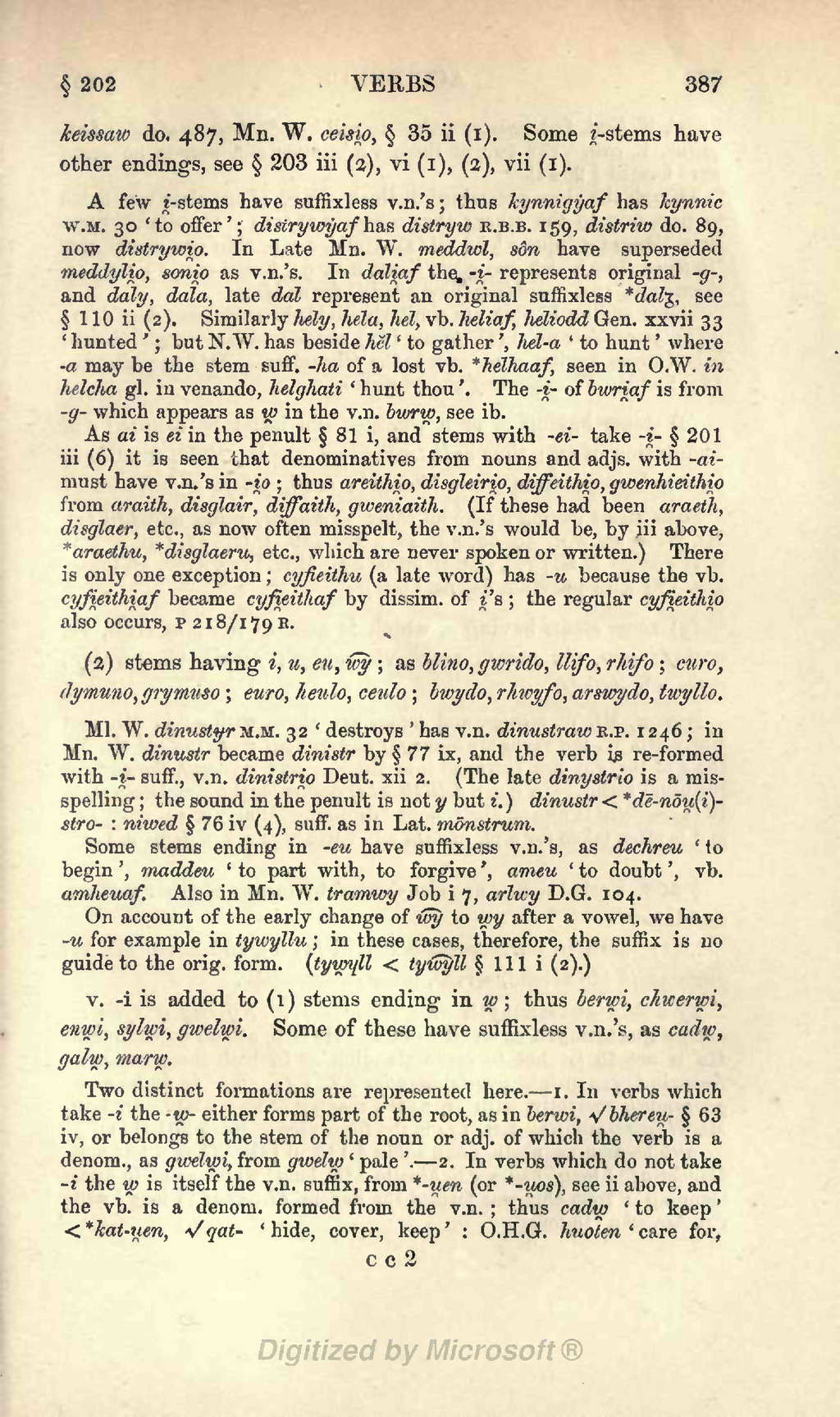keissaw do. 487, Mn. W. ceisi̯o, § 35 ii (1). Some i̯-stems have other endings, see § 203 iii (2), vi (1), (2), vii (1).
A few i̯‑stems have suffixless v.n.’s; thus kynnigẏaf has kynnic w.m. 30 ‘to offer’; distrywẏaf has distryw r.b.b. 159, distriw do. 89, now distrywi̯o. In Late Mn. W. meddwl, sôn have superseded meddyli̯o, soni̯o as v.n.’s. In dali̯af the ‑i̯- represents original ‑g‑, and daly, dala, late dal represent an original suffixless *dalᵹ, see § 110 ii (2). Similarly hely, hela, hel, vb. heliaf, heliodd Gen. xxvii 33 ‘hunted’; but N.W. has beside hĕl ‘to gather’, hel‑a ‘to hunt’ where ‑a may be the stem suff. ‑ha of a lost vb. *helhaaf, seen in O.W. in helcha gl. in venando, helghati ‘hunt thou’. The ‑i̯- of bwri̯af is from ‑g- which appears as w̯ in the v.n. bwrw̯, see ib.
As ai is ei in the penult § 81 i, and stems with ‑ei- take ‑i̯- § 201 iii (6) it is seen that denominatives from nouns and adjs. with ‑ai- must have v.n.’s in ‑i̯o; thus areithi̯o, disgleiri̯o, diffeithi̯o, gwenhieithi̯o from araith, disglair, diffaith, gweniaith. (If these had been araeth, disglaer, etc., as now often misspelt, the v.n.’s would be, by iii above, *araethu, *disglaeru, etc., which are never spoken or written.) There is only one exception; cyfieithu (a late word) has ‑u because the vb. cyfi̯eithi̯af became cyfi̯eithaf by dissim. of i̯’s; the regular cyfi̯eithi̯o also occurs, p 218/179 r.
(2) stems having i, u, eu, w͡y; as blino, gwrido, llifo, rhifo; curo, dymuno, grymuso; euro, heulo, ceulo; bwydo, rhwyfo, arswydo, twyllo.
Ml. W. dinustɏr m.m. 32 ‘destroys’ has v.n. dinustraw r.p. 1246; in Mn. W. dinustr became dinistr by § 77 ix, and the verb is re-formed with ‑i̯- suff., v.n. dinistri̯o Deut. xii 2. (The late dinystrio is a misspelling; the sound in the penult is not ỿ but i.) dinustr < *dē-nōu̯(i)-stro‑: niwed § 76 iv (4), suff. as in Lat. mōnstrum.
Some stems ending in ‑eu have suffixless v.n.’s, as dechreu ‘to begin’, maddeu ‘to part with, to forgive’, ameu ‘to doubt’, vb. amheuaf. Also in Mn. W. tramwy Job i 7, arlwy D.G. 104.
On account of the early change of w͡y to w̯ỿ after a vowel, we have ‑u for example in tỿwỿllu; in these cases, therefore, the suffix is no guide to the orig. form, (tỿw̯ɥll < tỿw͡yll § 111 i (2).)
v. ‑i is added to (1) stems ending in w̯; thus berw̯i, chwerw̯i, enw̯i, sylw̯i, gwelw̯i. Some of these have suffixless v.n.’s, as cadw̯, galw̯, marw̯.
c c 2
